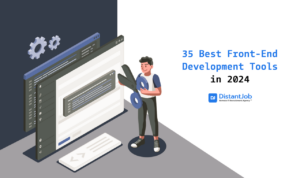With 78% of websites using PHP, the programming language continues to be the go-to server-side programming language for web development.
PHP frameworks provide essential structures and tools to streamline the creation of dynamic web applications. By adhering to established conventions and best practices, these frameworks enhance productivity and scalability, allowing you to focus on application logic.
In this article, we’ll explore the best PHP frameworks, offering unique features tailored to different development needs. From Laravel’s expressive syntax to Symfony’s modular architecture, we uncover the tools that empower you to explore PHP’s full potential in crafting powerful web applications.
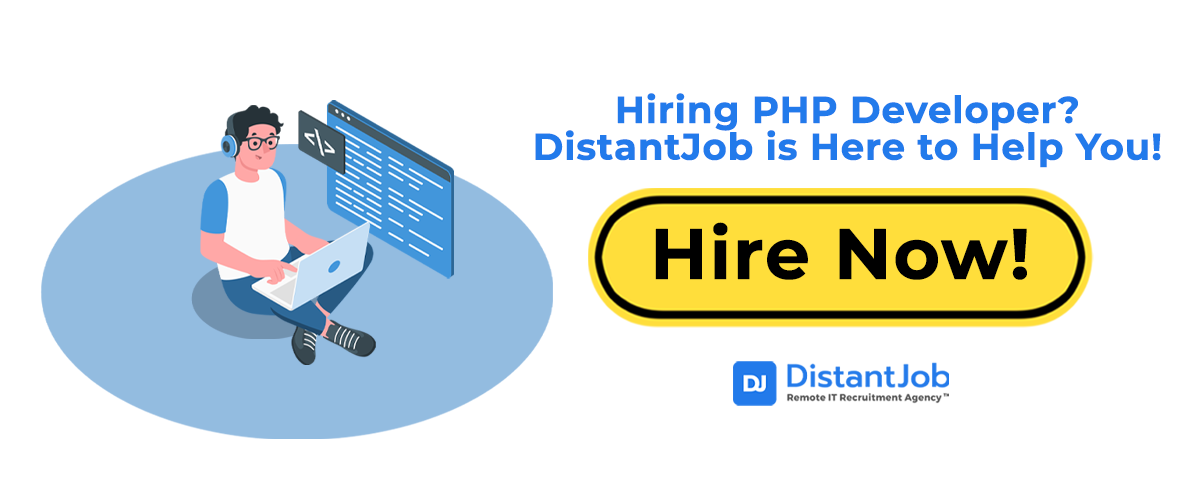
10 Top PHP Frameworks for Efficient Web Development
According to Wikipedia, there are over 40 PHP frameworks, each with its own set of features and particularities.
Some of them cater to beginners, offering simplicity and ease of use, while others target developers looking for robust testing or sophisticated package management capabilities.
With such diversity and so many choices, which framework is the best fit for your project? Let’s go over the best PHP frameworks in 2024.
1. Laravel

Laravel, also called “The PHP framework for web artisans,” is an open-source framework that follows the MVC pattern that helps developers manage their coding tasks more easily and simply.
Initially conceived as a more advanced alternative to CodeIgniter, it has gained popularity among programmers because it helps them code and manage complex and sophisticated web applications, and today stands as one of the most popular PHP frameworks.
Overview
- Release year: 2011
- Architecture: MVC (Model-View-Controller)
- Current version: Laravel 10
Why Use Laravel Framework?
One of the main reasons Laravel is so popular among web developers is that it makes coding straightforward. The software has an extensive library of pre-programmed functionalities, which reduces the amount of coding required. This way, building robust web apps with the software.
The framework is safe, thanks to its in-built access control system. It also provides a mechanism for handling any bugs or issues easily. Laravel lets you store passwords in an encrypted form, so you get that extra layer of protection.
In addition, Laravel is easy to learn. This is thanks to its thorough and accessible user documentation. The software includes easy-to-understand PHP screencasts, a great community, and podcasts to help you.
Things to Keep in Mind
Compared to other frameworks, Laravel isn’t cheap. It costs around $100 to $250 dollars to build a basic Laravel website. However, a more complex site with custom features may cost several thousands of dollars. In addition, a mid-level Laravel developer will cost $60-$100 per hour, while you can expect to pay between $100-$150+ per hour for a senior Laravel developer. So, consider your budget before starting a Laravel project.
Another thing to keep in mind is that the software gets frequent updates. While this isn’t a bad thing, it means the older version quickly becomes buggy, making it critical that you update the program to ensure optimal performance.
Best Uses for Laravel
Laravel is suitable for different web projects, especially those that require complex backend logic, secure transactions, and scalable infrastructure, like:
- Complex web applications
- E-Commerce platforms
- Content Management Systems (CMS)
- APIs for mobile applications
- Social networking applications
- Software as a Service (SaaS) platforms
2. Yii
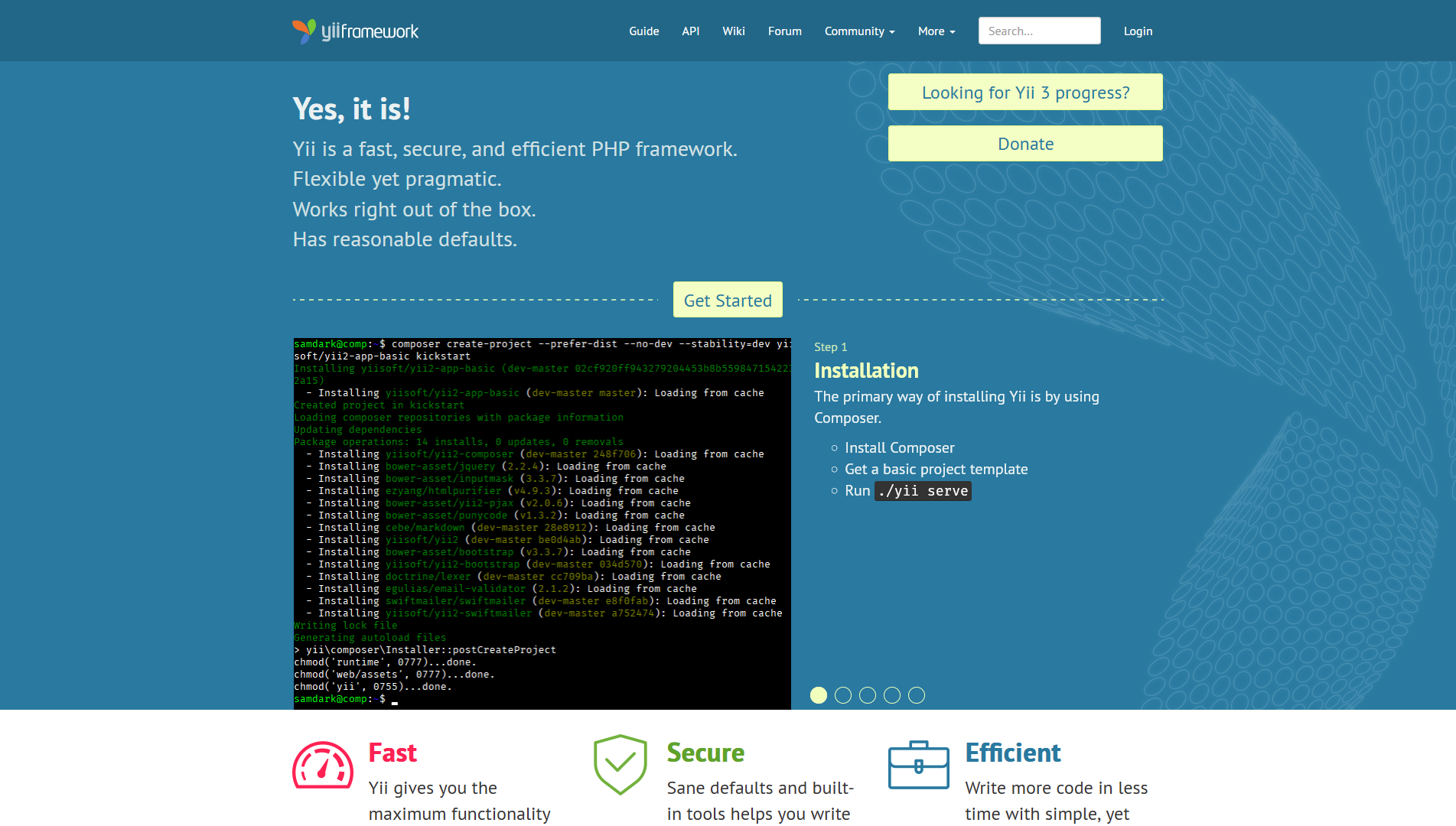
Yii is a PHP object-oriented framework known for its high performance in building modern web apps. For those wondering, Yii stands for Yes, it is!
One of the greatest features of this framework is that it’s suitable for all kinds of web apps. This means it’s a universal programming framework, easy to install, and useful for programmers who need to develop strong, secure, and fast applications.
Another characteristic of Yii is that it comes with a powerful class code generator called Gii. This extension provides a web-based code interface that helps developers generate models and modules and to get the desired code interactively.
Overview
- Release year: 2006
- Architecture: Architecture: MVC (Model-View-Controller)
- Current version: Yii 2.0
Why Use Yii Framework?
Yii makes web development more efficient and manageable. It is fully MVC (Model-View-Controller) and object-oriented, which makes it easier to organize and maintain code. It implements patrons really well and helps developers (and companies) adhere to best practices and coding standards.
This framework has excellent documentation, making it easy to find all relevant information for classes, components, etc. Several examples are available in the Wikis, and if you still need more information, there is an active community. Yii uses components that are popular among developers, such as Bootstrap or jQuery. Hence, it is easy to use and hiring Yii developers is a good choice.
Also, its fast and intuitive database migration process lets you implement database changes without much hassle.
Things to Keep in Mind
Yii has a steep learning curve for beginners. Greenhorn web developers familiar with a framework with a different philosophy may find Yii’s architecture and conventions intimidating. It’s simple view template engine doesn’t offer support for advanced features like template inheritance found in other frameworks.
Best Uses for Yii
Developers should consider using Yii for projects that require rapid development without sacrificing application performance or security. Here are some of its best uses:
- Enterprise applications
- Web portals
- Content Management Systems (CMS)
- Forums and social networks
- RESTful API development
3. Phalcon
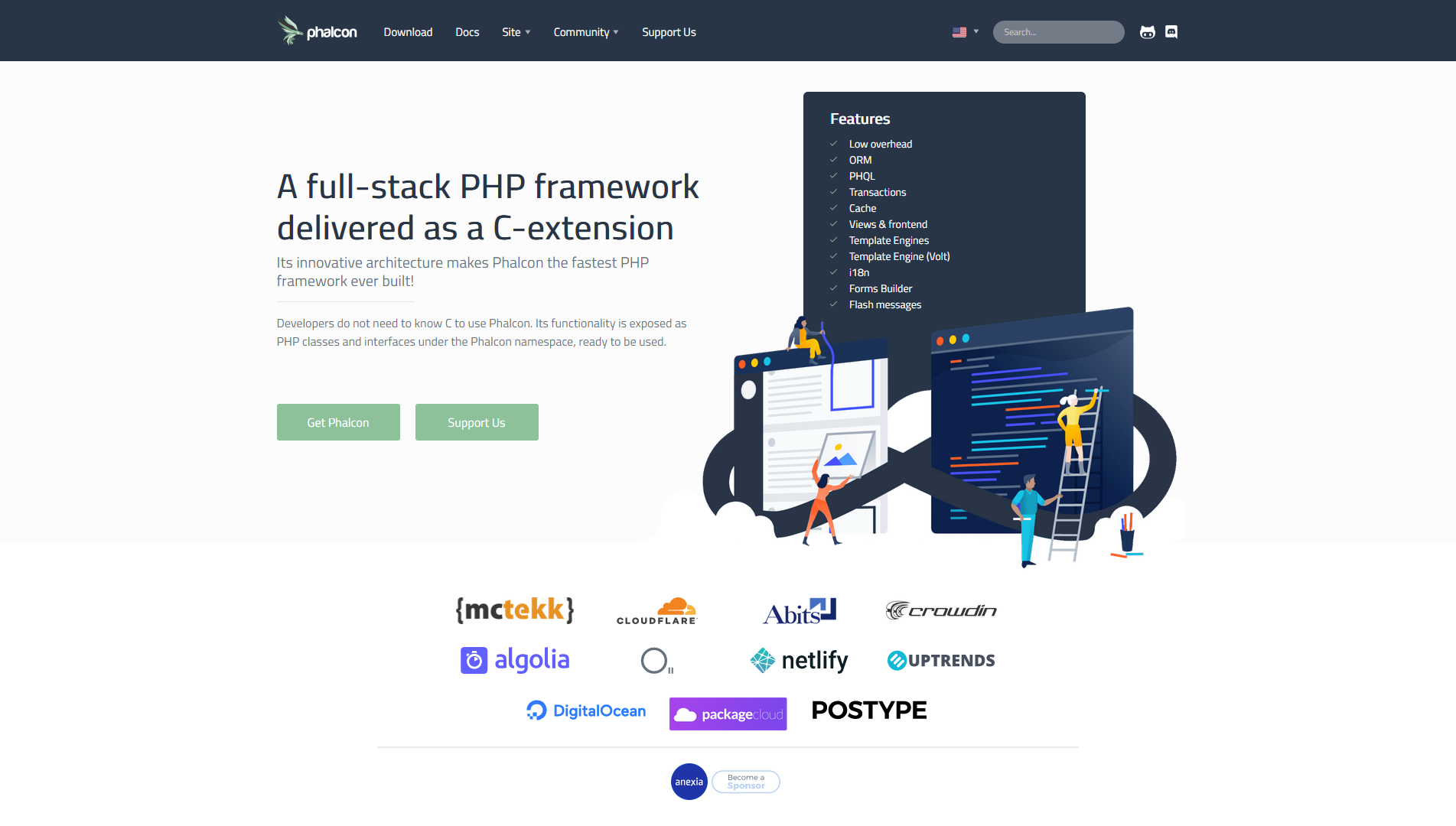
This full-stack PHP framework was initially written in the C and C++ programming languages. But since it’s delivered as a C-extension, developers who are not familiar with a C programming language don’t need to worry about learning it.
Two of the many distinctive characteristics Phalcon has is its speed and innovative architecture. It’s easy to install, and it’s one of the most helpful frameworks for building complex apps.
Phalcon includes, among other features, a forms builder that allows developers to quickly set up a form to present and collect data from users.
Overview
- Release year: 2012
- Architecture: MVC (Model-View-Controller)
- Current version: Phalcon 5.5.0
Why Use Phalcon Framework?
It is an open-source framework available under the BSD License. It has a Volt template engine embedded into Phalon itself and is nice to look at—with clear and understandable syntax. Volt also complies swiftly, like Phalcon, so it doesn’t obstruct the framework’s speed.
Phalcon is also extremely fast. The framework is an extension built on C, making it really fast and efficient. In fact, it is one of the fastest PHP frameworks, and according to some benchmarks, it is the fastest. Plus, there is an active community that supports users.
Things to Keep in Mind
One downside to Phalcon is that it is not ideal for shared hosting. This framework requires root access to install the PHP extension, which is written in C. Developers who want to use Phalcon must use cloud hosting or VPS with root privileges.
To carry out certain tasks, such as debugging, you must have C knowledge. You need to be a C programmer to debug C code or Zephir.
Best Uses for Phalcon
Its architecture and capabilities make it particularly well-suited for specific types of projects:
- High-Performance RESTful APIs
- Single Page Applications (SPAs)
- Backend Applications Requiring Intensive Data Processing
- Microservices Architecture
4. CakePHP
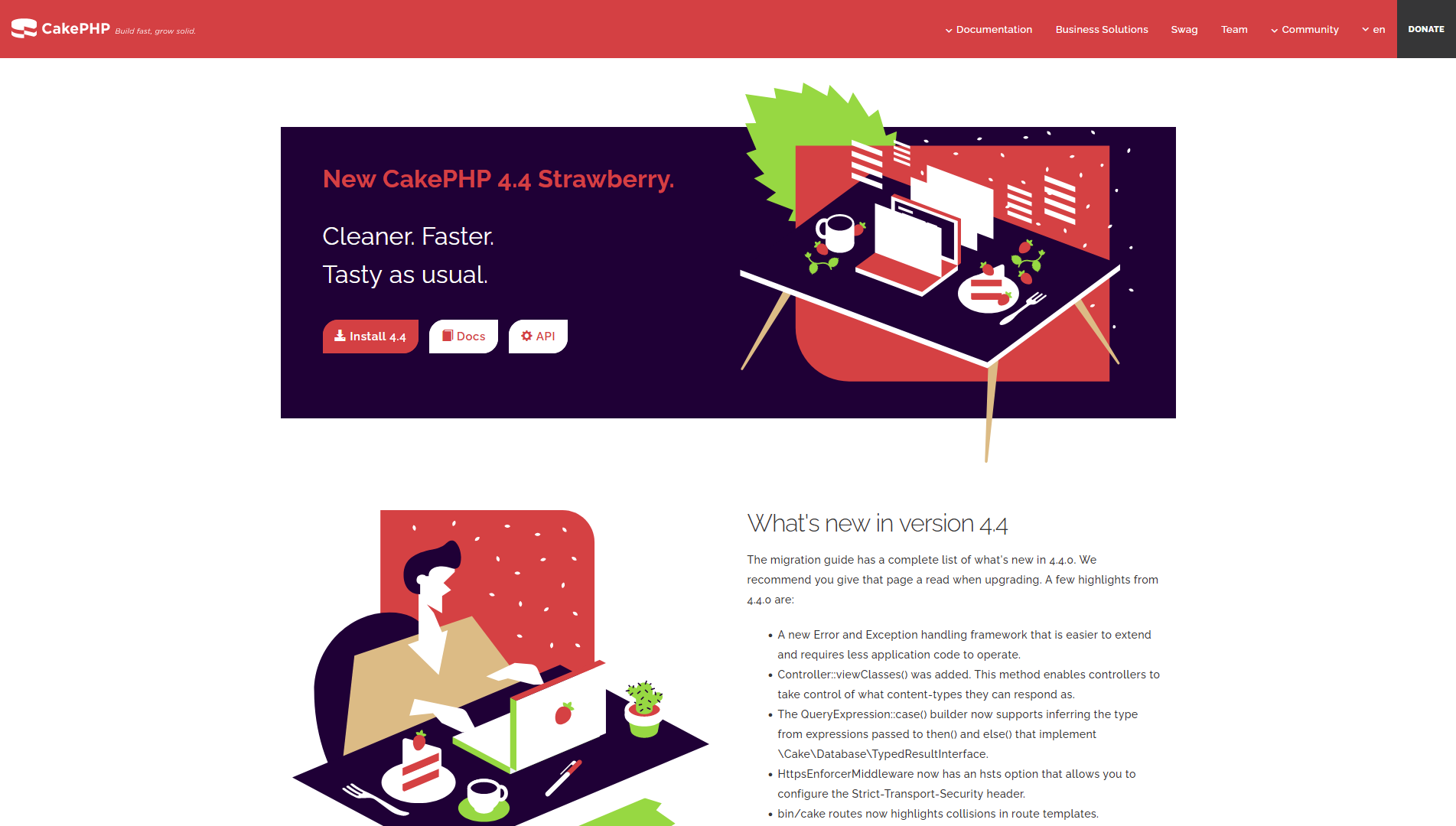
CakePHP is an open-source web framework written in PHP and follows the model-view-controller (MVC) approach.
It’s designed to facilitate rapid web application development with a minimum requirement for configuration. CakePHP streamlines the development process by providing a structured framework that enables developers to focus on the core aspects of their applications without having to reinvent the wheel for common tasks.
Overview
- Release year: 2006
- Architecture: MVC (Model-View-Controller)
- Current version: CakePHP 4.4.18.
Why Use CakePHP Framework?
CakePHP has built-in object-related mapping (ORM), a technique for transforming data between incompatible systems using an object-oriented programming language. Thus, working with database and CRUD operations becomes easier. Data is presented as classes, which define relations and predefined callbacks. It has two versions: 2 and 3. Version 3 supports PHP manager, whereas 2 doesn’t.
The framework supports rest API calls that work smoothly with XHR requests and your environment. When combined with their in-built magical methods that significantly minimize writing time, it is relatively simple to develop API calls.
There is also no pre-configuration required, so there is no need to spend time configuring Linux Apache MySQL PHP setup. CakePHP handles this by auto-detecting the settings that require configuration. It takes charge of built-in validation features, saving you time. Then, developers can create different validation rules.
Things to Keep in Mind
Users have reported finding it difficult to migrate from CakePHP 2 to 3. PHP doesn’t support several backward compatibility changes to become faster. As a result, developers cannot switch to an updated version but can directly develop applications in CakePHP 3 with new features. Also, compared to other frameworks, CakePHP has a slow response time when delivering the output in any app developed.
Best Uses for CakePHP
With its comprehensive set of features and rapid development capabilities, CakePHP is ideally suited for a wide range of web applications like:
- CRUD-heavy Applications
- Rapid Prototyping
- APIs for Mobile and Web Applications
- Social Networking Sites
5. CodeIgniter
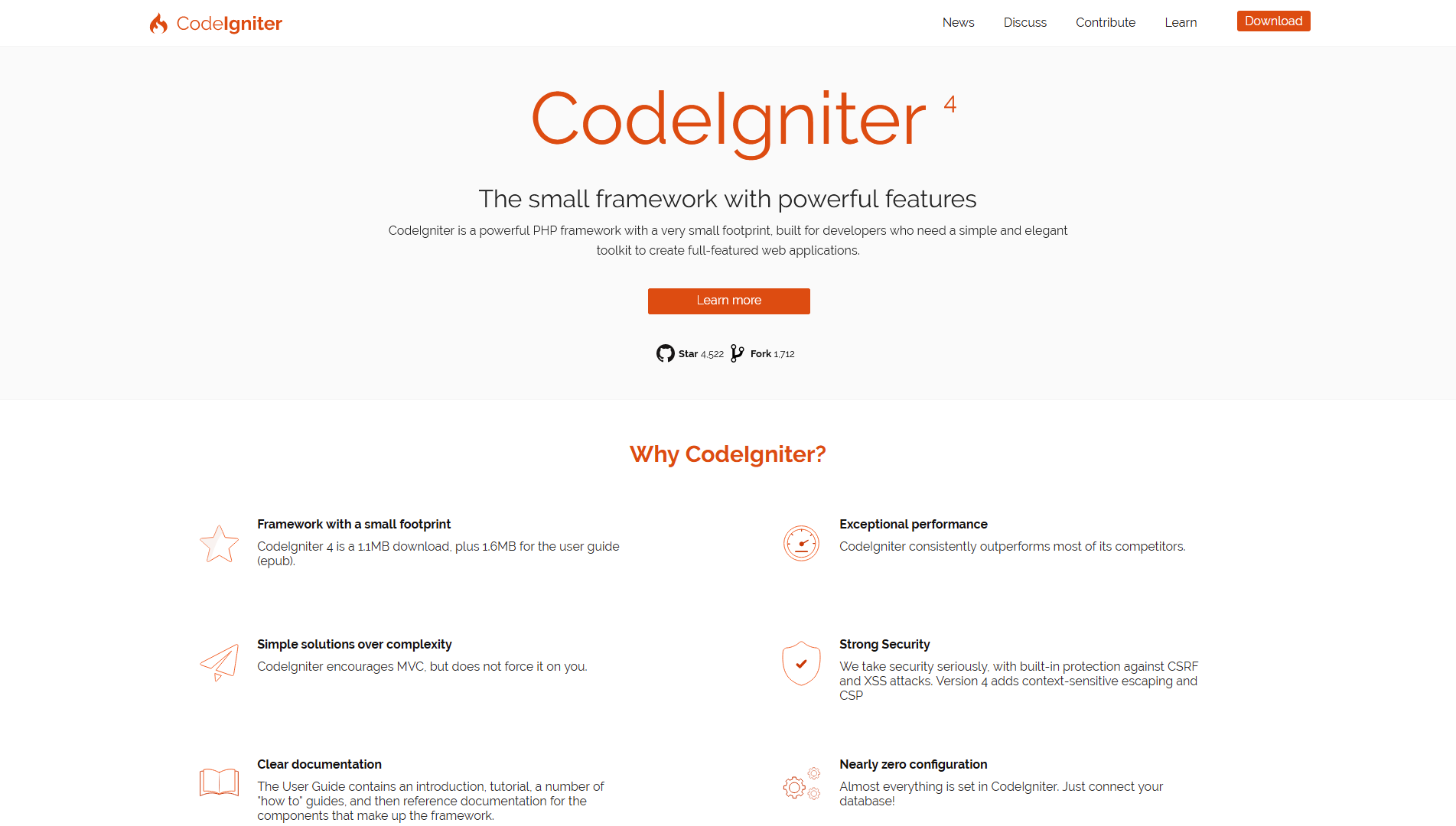
CodeIgniter is a lightweight framework (It’s only 1.1MB in size: the user guide is larger than the framework itself!) suitable for building dynamic websites. It offers a toolkit with diverse prebuilt modules to develop full-featured web apps.
CodeIgniter follows the Model-View-Controller (MVC) architectural pattern, which helps organize code in a way that separates the application logic from the presentation layer. This separation enhances the manageability and scalability of applications.
Overview
- Release year: 2006
- Architecture: MVC (Model-View-Controller)
- Current version: CodeIgniter v4.4.5
Why Use CodeIgniter Framework?
Codeigniter is a simple and easy-to-use framework. Its convention approach minimizes the need for a complex configuration, allowing developers to focus on the application logic rather than waste time on redundant code.
This program offers a high level of flexibility and customization. Developers can load only the necessary components and libraries for a specific project, resulting in lightweight and efficient applications. Selectively loading libraries and components allows developers to optimize application performance and reduce unnecessary overhead.
In addition to being fast, this framework helps programmers speed up web applications by implementing both page and database caching. It allows developers to cache web pages in their fully rendered state, reducing server load. Plus, it has a well-written user guide that covers every aspect of the framework in detail.
Things to Keep in Mind
This framework doesn’t support modular separation of code by default, so maintaining the code requires double the effort. Also, Codeigniter doesn’t have a built-in ORM system. Now, while you can use third-party systems or implement your own, developers must manage database interactions more manually, potentially leading to more errors and longer development times. Add these to having a relatively small community which can make finding resources tricky.
Best Uses for CodeIgniter
CodeIgniter is a versatile PHP framework that is particularly effective for projects requiring quick development, flexibility, and a balance between simplicity and functionality.
- Small to Medium-Sized Web Applications
- Prototyping and Proof of Concept Projects
- Educational Tools and Projects
- E-commerce Websites
6. Symfony
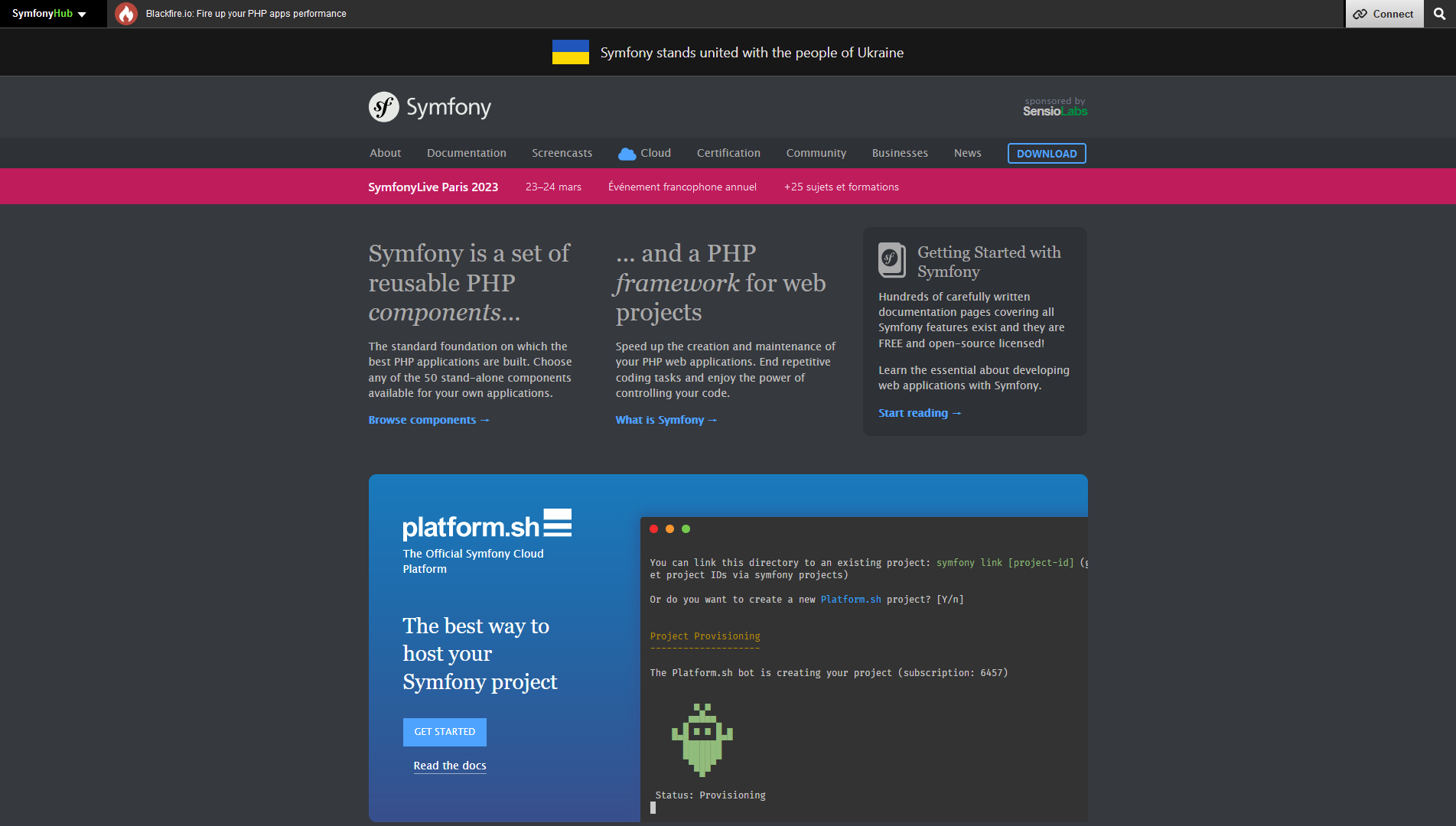
Symfony is an open-source framework known to be one of the best for building complex business websites. It has an MVC architecture pattern, and it offers various command-line tools to help developers save time during the process of web development.
One of the framework highlights is that with Symfony, programmers can write code in fewer lines. And it’s about 7% faster, making applications work efficiently.
This framework also offers customization features that make web apps user-friendlier. Its extremely powerful component system makes it possible to build complex products with multiple functionalities with select features and functions.
Overview
- Release year: 2005
- Architecture: MVC (Model-View-Controller)
- Current version: Symfony 7.0
Why Use Symfony Framework?
One of the benefits of Symfony is that it will increase your team’s coding speed. Thanks to Symfony Flex, a feature based on Symfony Recipes, a set of automated instructions to integrate third-party packages into your application.
It is a fully modular library that allows you to use only the parts you want easily. Simply plug it into other systems and easily augment or replace parts of it with other libraries. Symfony has a simple learning curve for any kind of developer — junior or senior, thanks to the detailed and easily accessible documentation.
Things to Keep in Mind
While this framework has a straightforward learning process, it can still be tricky. Developers who want to work with this framework must have solid architectural knowledge. Those with not-so-great software architectural knowledge may struggle to understand some of Symfony’s design patterns.
Symfony has an incredibly high number of dependencies. This means your custom modules will rely on a strict architecture. At some point, testing will take up a significant amount of your time, slowing down the development process.
Best Uses for Symfony
Symfony’s design principles and robust toolset make it a preferred choice for projects where scalability, maintainability, and a wide range of functionalities are crucial.
- Enterprise-level applications
- API development
- SaaS platforms
- E-commerce platforms
- CRUD-heavy applications
7. Laminas Project
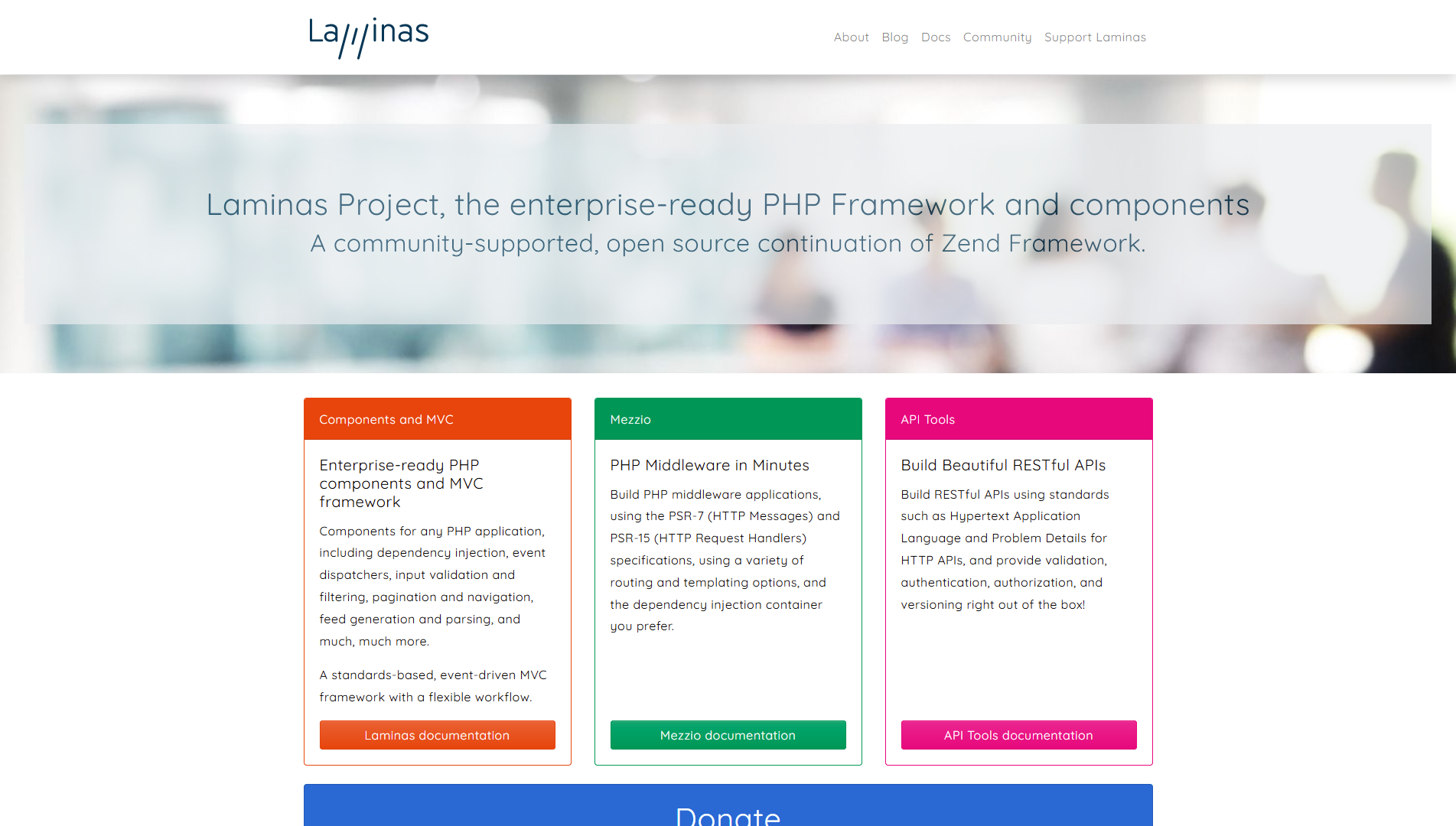
Previously known as Zend, the Laminas Project is an object-oriented PHP framework that allows developers to build high-quality websites. Most of Zend’s components are extendable because it uses many object-oriented concepts like inheritance and interfaces. This means that developers can implement their customizations.
Because of its faster development, security, good documentation, easy installation, and low configuration mechanism, it is highly valued among teams that implement Agile methodologies.
Overview
- Release year: 2006
- Architecture: Component-based framework
- Current version: Laminas 3.0
Why Use Laminas Project Framework?
Laminas Project enhances productivity. As lightweight, loosely coupled software, it provides 90% of the functionality everyone needs out of the box, but it can also be customized to meet the remaining 10% if your organization needs it.
Since the Laminas Project framework is focused on functionality, you can get started quickly. Another plus is that there are no configuration files to get rolling.
Things to Keep in Mind
The biggest downside of the Laminas Project is the community. It is so small that it is challenging to find resources and support. The learning curve is also not as simple as that of competitors. Developers must have strong architectural knowledge because any error will lead to significant issues down the road.
Best Uses for Laminas
Its architecture emphasizes modularity, reusability, and adherence to object-oriented programming principles, making it a good PHP framework for applications such as:
- Applications Requiring Custom Workflow
- Modular Applications
- Complex Web Applications
- API Development
8. FuelPHP
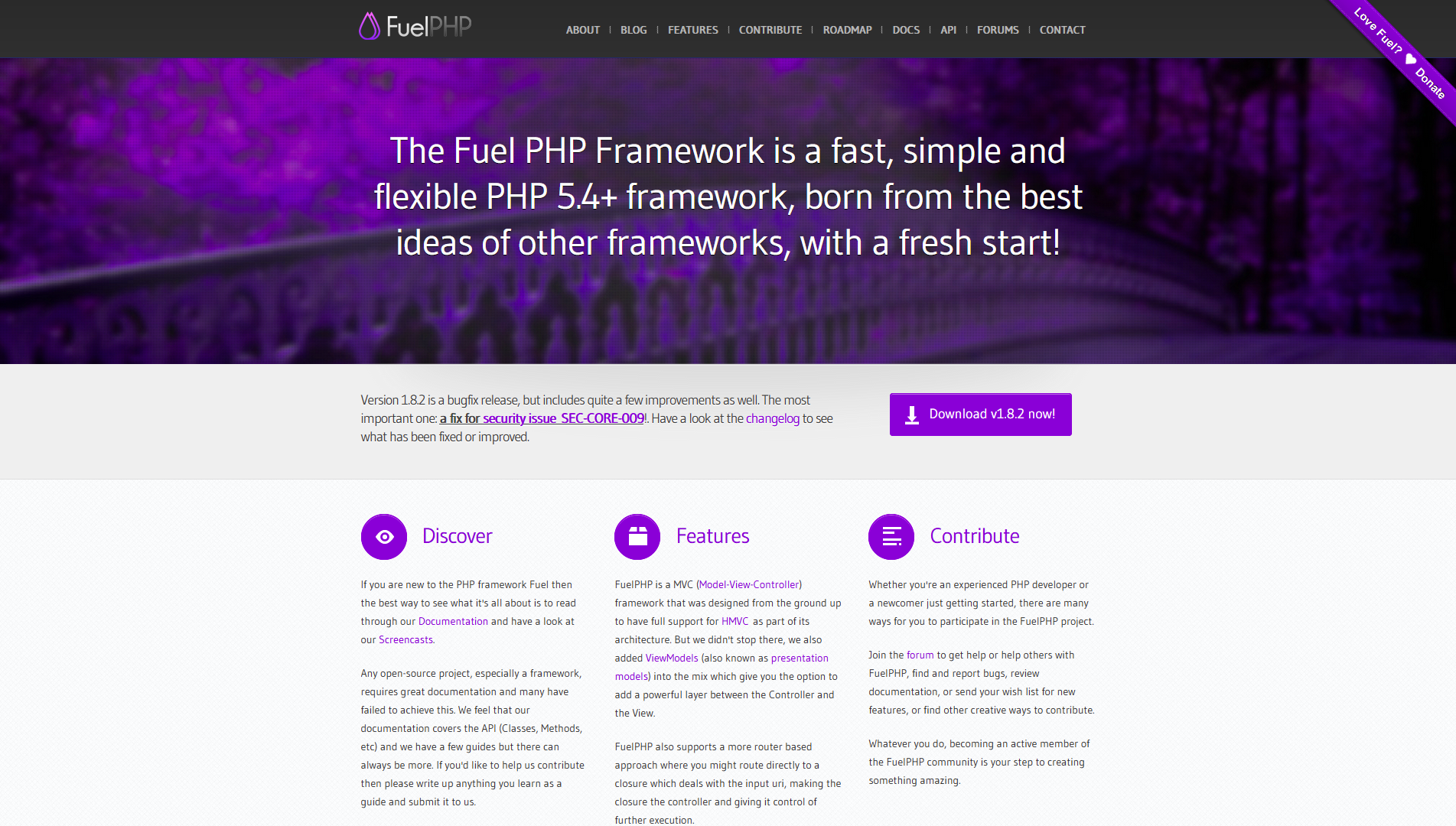
FuelPHP is a flexible, full-stack PHP framework that was built from the ground up to offer developers a powerful yet easy-to-use tool for web application development. It is designed around the Model-View-Controller (MVC) architecture pattern but also introduces its own improvements and concepts, notably HMVC (Hierarchical Model-View-Controller).
One of FuelPHP’s highlights is its security-focused system using URI filtering along with output encoding. Overall, this framework has proven to be a perfect solution for diverse platform sizes.
Overview
- Release year: 2011
- Architecture: Model-View-Controller (MVC) architecture, HMVC (Hierarchical Model-View-Controller).
- Current version: FuelPHP 1.8.2
Why Use FuelPHP Framework?
Out of the box, the FuelPHP framework has an HMVC structure, an architectural pattern that makes it easy to divide codes into smaller modules. This enables you to simplify the development process, enhance collaboration, and improve your codebase’s overall quality.
It is a flexible framework with few restrictions on writing code. The classes and controllers can be in any file structure, any folder can be the “modules” folder, and native classes can be extended in any way.
FuelPHP is a secure framework that has implemented several safety measures to keep applications safe, including SQL injection, XSS filtering, CSRF protection, input filtering, and output encoding in views.
Things to Keep in Mind
Because FuelPHP has a small community, finding resources and guides can be tricky. However, the FuelPHP team is quite responsive.
Best Uses for FuelPHP
FuelPHP’s design and feature set make it particularly well-suited for developing complex applications like:
- RESTful API Development
- Complex Web Applications with Modular Components
- Applications Requiring Scalable Architecture
- E-commerce Platforms
- Social Networking Sites
9. Fat-Free Framework (F3)
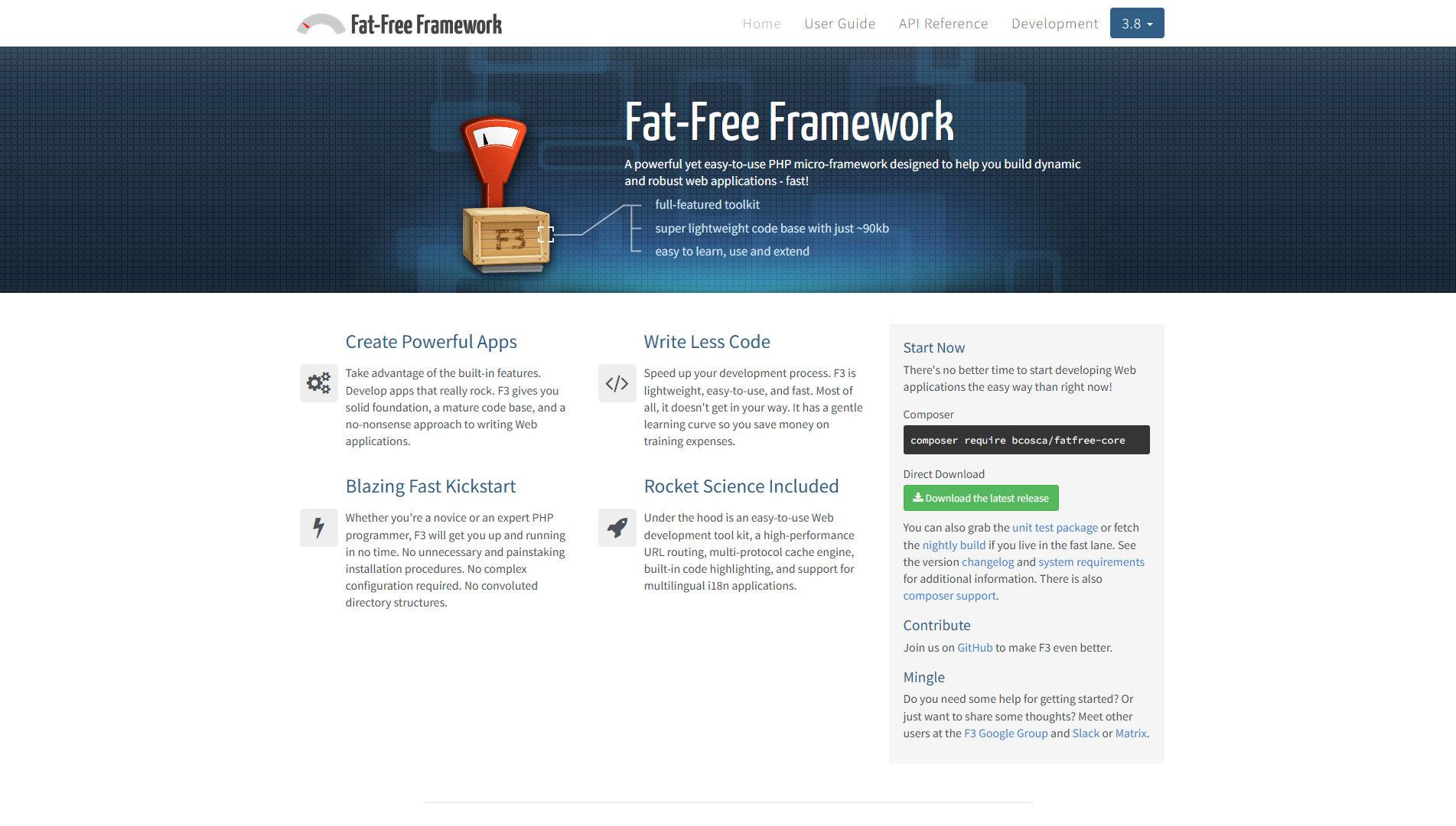
The Fat-Free framework markets itself as a small but powerful package with a codebase that doesn’t even reach the 1MB mark (currently sitting at 90kb). It doesn’t have as many features as other frameworks on this list, but it makes up for this fact by being extremely fast. It supports many popular databases, such as MySQL and SQLite, and has a lot of useful features related to security and authentication.
Its plugin functionality allows developers to add other features, such as unit testing, image processing, and shopping carts for commercial websites.
Overview
- Release year: 2009
- Architecture: It does not enforce any specific architectural pattern.
- Current version: Fat-Free 3.8.0
Why Use Fat-Free Framework (F3)
The most exciting thing about this framework is that it is easy to use. After downloading it, you can quickly start building your web application and avoid complex setup procedures or configurations. This makes it less overwhelming for new PHP or web developers to start using an MVC framework.
With Fat-Free Framework (F3), development time is shortened. Building an application that processes a URL requires very little code, allowing developers to focus on the application itself rather than the intricate setup details.
In addition, unlike competitors, F3 is not updated frequently, making it a stable choice for long-term projects.
Things to Keep in Mind
Compared to larger PHP frameworks like Laravel or Symfony, F3 has a smaller ecosystem. This can mean fewer third-party integrations and plugins, potentially requiring more custom development for specific functionalities.
The framework’s lack of enforced architectural patterns can cause inconsistent coding practices among developers.
Best Uses for Fat-Free
The Fat-Free Framework excels in scenarios that demand rapid development, simplicity, and high performance.
- Single-Page Applications (SPA)
- Backends
- Personal or Small Business Websites
- RESTful API Development
- Rapid Prototyping and Small Web Applications
10. Slim
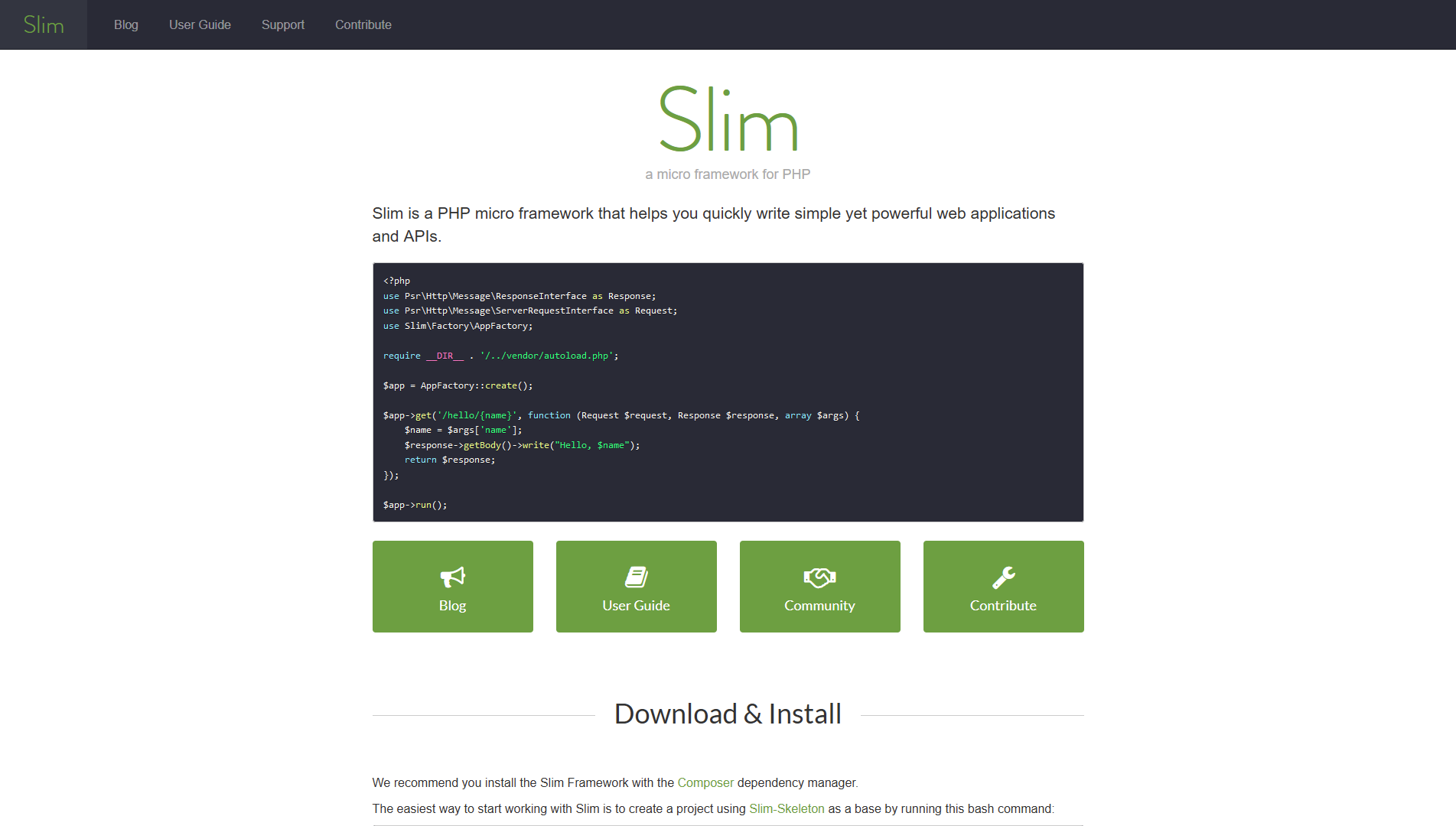
If you’re looking for a PHP framework to create an API, Slim may be the best option on this list. It’s what is called a microframework, a minimalist framework that lacks many of the features of full-stack frameworks such as Laravel or Symfony. Microframeworks usually specialize in processing HTTP requests and responses, and Slim is no exception.
Slim makes up for having few functionalities by being focused and extraordinarily lightweight, being the smallest codebase on this list (at around 60 kb). It can also be used to prototype or build actual web applications by using components.
Overview
- Release year: 2010
- Architecture: Round-based architecture
- Current version: Slim 4.12.0.
Why Use Slim Framework?
It supports tie-ins from Rack-like middleware. Rack is an interface used in Ruby frameworks to group and order modules, which are usually Ruby classes, and specify between them. Slim adopts a simple concept for its middleware. It unifies the middleware into a single method call by wrapping HTTP requests and responses. This framework is flexible as it doesn’t require you to use a single folder structure. Load it the right way, and you can organize your code as you see fit.
Also, Slim has a supportive community and well-maintained documentation, providing ample resources for beginners and experienced developers.
Things to Keep in Mind
One drawback of Slim is that it needs a strong foundation to create dependencies. One of the most significant advantages and disadvantages of Slim is its container schema. On the one hand, this schema ensures flexibility when adding anything. On the other hand, developers need to have a strong foundation of patterns and extensive knowledge of their libraries to convert them into a Slim dependency.
Slim is also too minimal. Yes, it is a microframework. However, it is still too minimal. It is perfect for simple prototypes and throwaway projects. But it loses its value in the long run, and then you end up implementing a full custom framework to make up for those missing features.
Best Uses for Slim
Slim Framework’s design caters to projects where performance, simplicity, and flexibility are key considerations.
- RESTful API Development
- Microservices Architecture
- Single-Page Applications (SPA)
- Backends
- Small to Medium Web Applications
Why Use a PHP Framework?
Committing to a framework can be challenging for two reasons: 1) You need to choose the right one (the one that makes sense for your project), and 2) Learning curve. Some frameworks and microframeworks are easy to digest and use, but others have a steep learning curve. So it is worth it?
While some developers are defenders of using PHP solo, there are other reasons why you should consider giving frameworks a try.
1. Structured Development
PHP frameworks enforce a structured development approach, promoting MVC (Model-View-Controller) architecture or similar patterns. This separation of concerns enhances code organization, making it easier to manage and maintain as the project scales.
2. Built-in Security Measures
Frameworks often have built-in security features such as input validation, CSRF (Cross-Site Request Forgery) protection, and SQL injection prevention mechanisms. These features help you mitigate common security vulnerabilities without implementing them from scratch.
3. It’s Best for Teams
When you’re working on a project using basic PHP code, it can become a mess, especially if you’re working with a team. Everyone might do things differently, which makes it harder to keep the code organized and up-to-date.
Frameworks provide the guidelines and tools that make it easier for everyone to work together. It’s like having a map to follow so you’re all on the same page.
4. Rapid Development
PHP frameworks provide many pre-built components, libraries, and tools that expedite development tasks. Features like ORM (Object-Relational Mapping), templating engines, and form validation helpers accelerate the development process, allowing you to focus on implementing business logic rather than reinventing the wheel.
5. Community Support and Documentation
Popular PHP frameworks have active developer communities and extensive documentation. This means you have access to resources, tutorials, and forums where you can seek assistance, share knowledge, and stay updated on best practices and emerging trends in framework usage.
6. Scalability and Performance Optimization
Many PHP frameworks offer features and optimizations for enhancing application scalability and performance. This includes caching mechanisms, database query optimization tools, and built-in support for asynchronous processing. By leveraging these features, you can ensure your applications remain responsive and efficient even under heavy loads.
Criteria for Choosing the Best PHP Framework
Before choosing a PHP framework for your web or app development project, consider the following factors to make an informed decision.
1. Project Requirement and Scope
Consider the scope and requirements of your project before deciding on a framework. For instance, a lightweight framework can provide faster development and easy maintenance for smaller projects with simple functionality.
Larger or more complex projects, on the other hand, require a more robust and scalable framework.
Assess your project’s specific requirements, including desired features and functionality. Some frameworks thrive in certain areas, such as e-commerce solutions, CMS development, or RESTful API development. Properly examining these factors will help you choose the right PHP framework for your project.
2. Developer Familiarity and Learning Curve
When choosing a framework, consider your team’s familiarity to ensure a smooth transition and minimize bottlenecks during development. It is important to strike a balance between what your team knows and the benefits of adopting a new framework.
Now, it can be tempting to stick with a framework your team is comfortable with, as it ensures efficiency and eliminates the learning curve. However, exploring new features can spark innovation, bring fresh perspectives, and improve development practices.
So, carefully examine the trade-offs and assess the long-term benefits of learning a new framework for your project.
3. Hosting Environment
The hosting environment is another factor to keep in mind when deciding on the best PHP framework. Frameworks may require customization to fit the hosting environment, especially in prominent ones like the cloud. Selecting a framework that easily integrates with the features of the opted hosting environment is critical for optimum performance.
4. Community Support and Documentation
Ensure the PHP framework you settle for has an active community and well-maintained documentation. These resources will provide valuable support when troubleshooting issues, implementing new features, or optimizing code.
In addition, examine the compatibility of the framework’s coding principles and methodologies with your team’s current skills.
5. Maintenance and Long-term Support
Choose a PHP framework that undergoes regular updates and maintenance. Frequent updates mean new features will be constantly introduced, ensuring compatibility with the latest advancements. A regularly updated framework also guarantees consistent support and security patches to keep your application secure.
6. Cost and Licensing
Evaluate the licensing terms for compliance and assess the level of community support and development activity. The cost evaluation ensures that your budget aligns with the framework’s pricing structure and any potential additional costs.
Find the Developers to Work With Your New PHP Framework with DistantJob!
When trying to decide the best PHP framework, comparisons are inevitable. But, as you’ve learned, these frameworks have different approaches to web app development. They help developers reach their goals and create awesome websites, but keep in mind that building a website is not only about making it pretty or fast. Other important aspects need to be taken care of by someone with a strong tech background.



